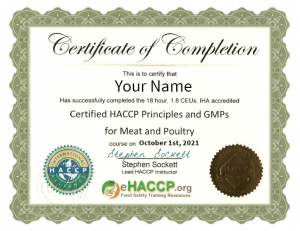February 7, 2022 (Global News Distribution) -
Legal and business perspectives on the reason for HACCP training and certification. Everything one needs to know about getting trained and HACCP certified.
To begin with, getting HACCP training and certification isn’t hard. It doesn’t require any prerequisites or experience. A bit of time, at least 16 hours’ worth, a little money, and a good enough attention span are the main requirements. Getting good HACCP training can prove tricky. Either way, a HACCP-certified person has some legal permissions and operational skill sets that are in high demand.
There are companies and individuals that provide this service. training and certification can be done online through an automated training platform, face to face with an instructor, online video, or online meetings, through any number of outreach programs such as universities, government entities, or technical colleges. Again, choosing the right provider and the right certification isn’t just about personal choice sometimes it comes down to what clients, employers, auditors, and/or regulatory bodies want.
The first thing that being HACCP will provide, assuming a reasonable amount of content is retained the majority of the training material, is the fundamental understanding of food safety. Learn biological, physical, chemical, and radiological hazards and know how to conduct a hazard analysis, understand who vulnerable people are in the population of consumers, what PRPs like allergen control programs are, essentially, know how to create a food safety plan. That’s a good thing.
On a legal note, one of the biggest driving factors for someone to become HACCP certified is that being HACCP certified will give one authority, by the FDA or USDA, and depending upon the type of certification one can create, modify and sign food safety documentation. This is very important when submitting an application for approval because they’ll ask who created and signed the plan. HACCP for Meat and Poultry for a meat processor makes sense but HACCP for Juice would be applicable to that same processor.
Should a business, without a HACCP qualified person who created the food safety documentation and protocols, produce food that when consumed by someone that hurt them, a broken tooth from a cherry pit in a cherry pit, made them sick from eating an improperly prepared RTE meal, or contracting e. coli infection from a contaminated product due to poor worker hygiene practices, the business could and, most likely would face serious legal repercussions. These consequences wouldn’t be mitigated by insurance because insurance covers a business following the law.
What law are we referring to? Here are a few links to some legal and government sites that define what a trained person is;
21 CFR § 120.8 – https://www.accessdata.fda.gov/scripts/cdrh/cfdocs/cfcfr/CFRSearch.cfm?fr=120.8
21 CFR Part 123 – https://www.accessdata.fda.gov/scripts/cdrh/cfdocs/cfcfr/cfrsearch.cfm?fr=123.6
21 CFR § 117 – https://www.accessdata.fda.gov/scripts/cdrh/cfdocs/cfcfr/CFRSearch.cfm?fr=117.4
9 CFR § 417.2 – https://www.law.cornell.edu/cfr/text/9/417.2
On a business side and as a business owner being HACCP trained and certified gives one the keys to making their own food safety system rather than paying a consultant to do it. At the very least, if one does hire a consultant, they’llbe much better prepared and less likely to be taken advantage of, should that situation ever occur. A HACCP system can also act as a process improvement mechanism saving process steps, money, and time and because one should have a rigorous supplier approval program in place, sourcing of raw materials can improve overall quality. There are many good business reasons.
From the perspective of an individual, getting HACCP trained and certified can lead into employment with the company of choice at a better salary rate than if one didn’t have a HACCP certification. If one is already employed it could open the door to new departments like Quality Assurance and the salary would go up as well.
Be amazed at what there is to learn and be motivated to keep learning and continue down the path of food safety for a company.
Stephen Sockett
eHACCP
+1 613-307-8988
Visit us on social media:
Facebook
LinkedIn







